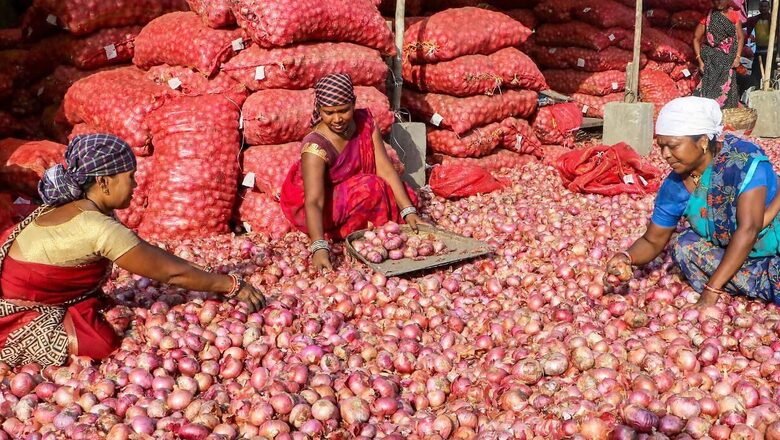
views
India’s annual retail inflation in July rose to its highest in 15 months on the back of rising prices of vegetables, and cereals. India’s annual retail inflation rose sharply to 7.44% in July from 4.87% in June. Food inflation, which accounts for nearly half of the consumer price index, hit 11.51% in July compared to 4.49% in June. Retail food inflation was at its highest since January 2020.
The RBI raised its inflation forecast for the current financial year to 5.4% from 5.1% earlier citing food prices. Vegetable inflation rose by 37.34% on the back of rising prices for commonly used vegetables, including tomatoes, onions, peas, brinjal, garlic, and ginger.
The Ministry of Consumer Affairs, Public Distribution and Food has a hawk’s eye on food inflation and has, since almost the very beginning of this year, taken a series of measures to cool down prices in cereals, pulses as well as vegetables, officials say.
At the end of January, the government approved a proposal for offloading 30 LMT of wheat within a span of two months from the central pool under the open market sale scheme (OMSS) through traders, state governments, cooperative federations, and PSUs to ease domestic wheat and wheat flour prices. Under the proposal, wheat was offered to flour millers through e-auction for a maximum quantity of 3,000 MT per buyer per auction, state governments for their schemes without e-auctions, as well as government PSUs/ cooperatives/ Federations/ Kendriya bhandars/ NCCF/ NAFED, etc, also without e-auctions. The stipulation was that the buyer will convert the wheat into flour and offer it to the public as a maximum retail price of Rs 29.50 per kg (PIB: 25th January 2023). On the first day of the e-auction, 8.8 LMT was sold across 22 states. This rose to 9.2 LMT. The group of ministers headed by home minister Amit Shah reviewed the prices of essential commodities on 25th January, which was followed by the department of food and public distribution. 6 weekly e-auctions for wheat were conducted by the FCI till 15.03.2023. A total quantity of 33.7 LMT wheat was offloaded and the prices for wheat came down by 19% due to this massive intervention in a span of 45 days. Due to Rabi procurement period of wheat, the market intervention was suspended.
From 2nd February, Kendriya Bhandars, and from 6th of February this year, NAFED (National Agricultural Cooperative Marketing Federation of India), and NCCF (National Cooperative Consumers Federation of India) started selling wheat flour (atta) at 29.50/kg through various retail outlets and even mobile vans. Again, the move was to curb inflationary trends under the name of “Bharat atta”. Corporations, cooperatives federations and self-help groups of various states and UTs could also get wheat at Rs 23.50/kg on the recommendation of respective governments/UTs for sale to consumers at Rs 29.50/kg.
The e-auction has already left an impact of fall in market prices of wheat by more than 10% in the past week and is expected to fall further (PIB: 3rd February 2023).
In order to manage the overall food security of the country and control the increasing prices of foodgrains, the Government of India amended the export policy of wheat from “free” to “prohibited” category on 13th May 2022 to restrict the export of Indian durum wheat, and from 12th July 2022, the export of atta was subject to the recommendation of Inter-Ministerial Committee (IMC) on the export of wheat. The export of broken rice has been banned and an export duty of 20% imposed on non-Basmati rice except for par-boiled rice with effect from 9th September 2022.
To augment domestic availability and moderate prices of pulses, import of tur and urad have been kept under the “free category” until 31.03.2024. Import duty on masoor has been reduced to “zero” till 31.03.2024. To prevent hoarding and restrictive trade practices in respect to tur, the government has issued a directive to all the states and UTs to enforce stock disclosure by stockholders under the Essential Commodities Act, 1955, and also to verify and monitor stocks. The stocks of chana and moong from the Price Support Scheme and Price Stabilization Fund are being released continuously in the market to moderate the prices and also supplied to states for welfare schemes.
In order to stabilise the volatility in the prices of onions, the government procured a record 2.51 LMT from Rabi 2022 and released it in major consumption centres during September 2022 and January 2023.
To control prices of edible oils, the government reduced the basic import duty on crude palm oil, crude soybean oil, and crude sunflower oil from 2.5% to zero. Agri cess on these oils has been brought down from 20% to 5%. The basic duty on refined soyabean oil and refined sunflower oil has been reduced to 17.5% from the previous rate of 32.5% with effect from 15.06.2023. The basic duty on refined palm oils has been reduced from 17.5% to 12.5% on 21.12.2021 and this duty has been extended up to 31st March 2024. Import of refined palm oils is under the “free“ category till further orders. “Due to continuous efforts made by the government, the retail prices of Refined Sunflower Oil, Refined Soyabean Oil and RBD Palmolein have decreased by 29.04%, 18.98% and 25.43% respectively,” minister of state MoCAFPD, Sadhvi Niranjan Jyoti, said in a written reply in the Lok Sabha on 26th July.
Here’s a list of announcements and steps taken by the government to tackle price rise/inflation:
17th February: PIB said the Department of Food and Public Distribution has decided to further reduce reserve price of wheat up to 31st March 2023. Reduction in Reserve Price to help in reducing market price of wheat and wheat products. Reserve price under OMSS (domestic) has been fixed at Rs 2,150 for wheat ( FAQ) and Rs 21.25 Qtl pan-India for wheat (URS) of all crops including RMS 2023-24 for sale of wheat to private parties. States may be allowed to purchase wheat from FCI for their own scheme at above proposed reserve prices without participating in e-auction. FCI will float 3rd e-auction for sale of wheat at these revised prices on 17.02.2023, which will be opened on 22.02.2023.
18th February: In the third e-auction around 11.72 LMT of wheat Is being offered by FCI from 620 depots in the country. (During the 1st and 2nd e-auction 12.98 LMT were sold out). The 3rd e-auction was held on 22nd 02 2023 and 5.07 LMT was auctioned. The overall price trend suggests that the market has cooled down and is below 2200/quintal on average. Offloading of wheat had the desired impact.
21st February: The Government of India decided that FCI may offload another 20 LMT of wheat for sale through e-auctions.
1st March: Fourth e-auction 11.57LMT was offered and 5.40 LMT has been sold to 1040 bidders in 23 states. 09.03.2023, the fifth e-auction ( 11.88 LMT) offered and 5.39 LMT sold. 6th e auction – 10.69 LMT wheat was offered – 4.91 LMT sold Cumulative — 33.77 LMT. Goi allowed e auctions until 31st march 2023.
6th March: PM chaired a high-level meeting to review preparedness for hot weather for the upcoming summer months and was briefed about, among other things, the forecast of monsoon, and its impact on Rabi crops. The meeting was held at his residence at 7 LKM. The PM instructed that the availability of fodder and water in reservoirs should be tracked. FCI was asked to prepare to ensure optimal storage of food grains in extreme weather conditions. Was briefed about the IMD forecast, the likelihood of a normal monsoon. He was also briefed about the impact of weather on Rabi crops.
8th March: NAFED, on the direction of GOI, will initiate procurement of onions to address the issue of falling prices of onion in Gujarat. Move expected to stabilise onion prices in the market. Procurement would start from Bhavnagar, Gondal and Porbandar. A similar intervention has been undertaken in Maharashtra since 24th February in the Nashik Lasalgaon area.
27th March: Centre constitutes a committee to monitor the stock disclosure of Tur. The decision was taken against the backdrop of reports of market players not releasing stocks despite the regular arrival of imports in good quantities. On 12th August 2022, the Centre had issued an advisory to the states and UTs to enforce stock disclosure in respect to Tur under the Essential Commodities Act, 1995. In order to facilitate smooth and seamless import, the government has removed the 10% duty applicable for Tur imports from non-LDC countries.
29th March: Pulse importers were directed to declare all stocks available with them.
2nd June: The Centre imposed stock limits on urad and tur pulses with immediate effect till 31st October, another step to combat rising prices of essential commodities, by preventing hoarding, unscrupulous speculation, and improving affordability. Stock limits – 200 MT for wholesalers, 5 MT for retailers, 5 MT at each retail outlet, 200 MT at the depot for wholesalers, 5 MT and last three months of production or 25% of annual installed capacity, whichever is higher. In respect of importers, the importers are not to hold imported stock beyond 30 days of custom clearance.
6th June: In order to boost domestic production, the government removed the 40% ceiling for procurement of tur, urad, and masoor under the price support scheme (PSS) for 2023-24. This decision is expected to increase the sowing areas of these pulses during the upcoming Kharif and Rabi seasons. The decision assures the procurement of pulses from these farmers without MSP for 2023 -24. This will motivate farmers to increase the sowing area in Kharif and Rabi seasons.
12th June: Centre imposed stock limits on wheat applicable to all stakeholders with immediate effect till 31st March 2024. Stock limit for wheat– traders/ wholesalers 3,000 MT, retailer 10 MT for each retail outlet, big chain retailers 10 MT for each outlet and 3,000 MT at all their depots, and processors 75% of annual installed capacity. However, this time, state governments were excluded from the scheme.
The Centre also decided to offload another 15 LMT of wheat from the central pool stock in the first phase under the Open Market Sale Scheme in order to moderate the prices. And, this time, it decided that rice be also offloaded under OMSS. Unlike before, this time the maximum amount a bidder could purchase was 10 to 100 MT and unlike before, state governments were barred from participating. 4 LMT of wheat was being offered in the first e-auction. The e-auction for rice under OMSS (Domestic) would commence on 5th July 2023. The base price of rice was Rs 3,100/qtl.
27th June: Government to release tur from national buffer till imported stocks arrive in the Indian market. Tur to be disposed of through online auction among eligible millers. Again, the move was to augment the availability at affordable prices. The government decided to release tur from the national buffer in a calibrated and targeted manner till imported stocks arrive in the local markets.
30th June: The government announced the Tomato Grand Challenge hackathon to generate innovative ideas to enhance the tomato value chain and ensure availability at affordable prices. (TGC) invited ideas on comprehensive and focused area interventions in the tomato value chain from cropping and market insights for the farmers, appropriate cultivars with higher shelf life, improved transportation of fresh and processing products, and innovative packaging and storage.
Tomato is produced in all areas of India in varying degrees. Maximum production is in southern and western regions of India, contributing 56% to 58% of all-India production. Southern and western regions being surplus states, feed to the other markets depending on production seasons. The production seasons are also different across regions. The peak harvesting season occurred from December to February. The periods during July-August and October-November are the lean production months of tomato. July coinciding with monsoon season adds to further challenges of transportation, distribution, and increased transit losses, adding to price rise.
12th July: The Department of Consumer Affairs directs procurement of tomatoes from AP, Karnataka, and Maharashtra for distribution in major consumption centres to check increasing retail prices. Tomatoes to be distributed at discounted prices to all areas of concern (where retail prices have recorded the maximum increase in the last month) including Delhi-NCR. NAFED and NCCF were directed to procure tomatoes from mandis. The targeted centres for release have been identified on the basis of the absolute increase in retail prices over the past month in centres where prevailing prices are above the all-India average. Currently, the supplies are coming to markets in Gujarat, MP, and some other states mostly from Maharashtra, especially Satara, Narayangaon, and Nashik, which is expected to last till the end of this month. Madanapalle (Chittoor) in Andhra Pradesh has also continued arrivals in reasonable quantities. The arrivals in Delhi-NCR are mainly from Himachal Pradesh and some quantity comes from Kolar in Karnataka. New crop arrivals are expected from Nashik district. Furthermore, in August, additional supply is expected to come from Narayangaon and Aurangabad belt. MP arrivals are also expected to start.
14th July: The government started extensive market intervention with the NCCF distributing tomatoes at subsidised prices.
15th July: Extensive market intervention in Delhi, Gurugram, and Noida – approximately 18,000 kg tomatoes were sold across Delhi-NCR. It seemed to have an impact. Sharp drop in Azadpur mandi prices and slight dip in retail price. Sales were initiated in Lucknow and 7,000 kg of tomatoes were sold.
17th July: Piyush Goyal launches the sale of subsidised chana dal under the name of “Bharat dal” for Rs 60 per kg for one pack of 1 kg, and Rs 55 per kg for 30 kg pack through NAFED and NCCF, Kendriya Bhandar and Safal. The chana dal under this arrangement is also made available to the state governments for supplies under their welfare schemes. Government intervened to make pulses available to consumers at affordable prices. Chana dal is the most abundantly produced dal in the country. The chana stock of the government was converted into chana dal.
18th July: Government intervened in the retail market in Kanpur also while continuing the interventions in Delhi and Lucknow for tomatoes. The discounted price was Rs 90 a kg. On the 15th, Rs 80 a kilo. On the 16th, sales started at several points each in Delhi, Noida, Lucknow, Kanpur, Varanasi, Patna, Muzaffarpur, and Arrah. Prices further slashed to Rs 70/kg (till 18th July 391 MT of tomatoes had been procured by NCCF and NAFED – disposed of in Delhi-NCR, Rajasthan, UP, and Bihar.
9th August: The PIB said the Government of India has decided that FCI shall offload 50 LMT of wheat and 25 LMT of rice under the Open Market Sale Scheme (Domestic) for sale through e-auctions. Keeping in view the experience of the past 5 e-auctions for rice by FCI, it has been decided that the reserve price will be brought down by Rs 200 a quintal and effective price will be Rs 2,999/quintal. The cost on account of reduction in the reserve price will be borne from the Price Stabilisation Fund maintained by the Department of Consumer Affairs.
The government said in a statement, “As on 7.08.2023 in one year, the wheat prices have gone up by 6.77% in the retail market and 7.37% in the wholesale market. Similarly, the rice prices in the retail market have gone up by 10.63% and 11.12% in the wholesale market.”
11th August: The Department of Consumer Affairs decided to release onions from 3 LMT onion buffer created out of the Rabi crop in June and July from Maharashtra and MP. NCCDF and NAFED had procured 1.5 LMT of onions each. Onion buffer is also maintained under the price stabilisation fund. For this procurement is during the Rabi season for release in major consumption centres in the lean season. The decision followed a meeting by Rohit Kumar Singh, Secretary of the department with NAFED and NCCF on 10.08.2023. The buffer created could be enhanced further if the situation demands. Onion buffer size has tripled from 1 LMT in 2020-21 to 3 LMT in 2023-24. On 19th August, the government imposed a 40% export duty on onions with immediate effect till the 31st of December 2023. This was done to improve domestic availability of onions.
12th August: The government organised a mega sale of onions at Rs 70 a kg in Delhi and NCR, Rajasthan, UP. There was a positive impact in stabilising both wholesale market prices and retail market prices. Lucknow wholesale Rs 70 to 80, retail Rs 80-100, Kanpur – wholesale Rs 50-60 and retail Rs 80 to 100, Varanasi wholesale Rs 70 to 80, retail Rs 90-100, Jaipur wholesale Rs 65-70, retail Rs 90-100, Delhi wholesale Rs 70 to 80, retail Rs 80 to 100. In Delhi, on 12th August 36,500 kg of tomatoes were distributed. Mega sale continued on the 13th also as 35,500 kg of tomatoes were sold. In two days, 71,500 kg of tomatoes were sold. After a one-day break, from the 15th, NCCF and NAFED sold tomatoes at Rs 50 a kilo. The retail sale of tomatoes had started on 14th July and till 15th August a total of 15 lakh kg of tomatoes had been procured by the two agencies. The price of government tomatoes was slashed to Rs 40 a kg from the 20th of August.
After imposing stock limits, central govt officers also followed up with various stakeholders to see that these decisions were being complied with.
FCI undertakes the movement of food grains throughout the country to intervene in the market for price stabilisation of food grains. Around 600 LMT of food grain are moved annually to various corners of the country from major procuring states like Punjab, Haryana, Andhra Pradesh, Telangana, Chhattisgarh, Odisha, etc. Its storage capacity has increased from 6 LMT in 1995 to more than 800 LMT at present. Cereal inflation increased to 13.04% from 12.7% in June.
India banned the export of non-Basmati rice, wheat, and sugar, imposed stock limits of tur and urad dal, and slashed import duty on edible oils and pulses. It may abolish the 40% duty on wheat imports.
Steps taken by the government include offloading 5 million tonnes of wheat and 2.5 million tonnes of rice from the FCI in the open market. All-India average retail prices of wheat flour and rice have risen to Rs 35 and Rs 40 respectively from Rs 30 and Rs 34 a year ago.



















Comments
0 comment